Spleen Qi Deficiency
The information provided here is not a replacement for a doctor. You shouldn't use it for the purpose of self-diagnosing or self-medicating but rather so you can have a more informed discussion with a professional TCM practitioner.
At a glance
Preliminary reading: What is a pattern? The Spleen in Chinese Medicine The concept of Qi The concept of Deficiency
Key attributes
Chinese name: 脾气虚 Pinyin name: Pí Qì Xū
Pattern nature: Empty
Pattern hierarchy: Specific pattern under Qi Deficiency
Common combinations: Spleen and Lung Qi Deficiency Stomach and Spleen Qi Deficiency Spleen and Kidney Qi Deficiency
Causes
Precursor patterns: Lung Qi Deficiency Stomach Qi Deficiency Damp-Phlegm in the Lungs and six other possible precursors
Common causes: 1. Diet, 2. Emotional stress, 3. External Dampness, 4. Chronic disease, 5. Mental-excertion
Diagnosis
Common symptoms: Gas Obesity Bloating Lassitude Overweight and five other symptoms
Pulse type(s): Empty (Xu)
Tongue description: Pale or normal tongue with thin white coating. Possible swollen with tooth marks on sides and transverse cracks
Treatment
Treatment principle: Tonify Spleen Qi
Common formulas: Si Jun Zi Tang Liu Jun Zi Tang Fei Er Wan
Pathology
Spleen Qi Deficiency is one of the most commonly seen disharmony. The three most common causes for this pattern are unhealthy diet, emotional stress and mental-excertion as they can largely harm the transformation and transportation function of the Spleen. This pattern gives rise to various digesting issues such as poor appetite, slightly abdominal distension and pain after eating, gas, bloating and or loose stools.
When the Spleen Qi is weak, it fails to transport Food-Qi throughout the body, hence the symptoms of pale tongue and complexion, general fatigue and lassitude. The patients would rather to lie down. The Food-Qi can neither travel to the four limbs to nourish them, resulting in weak limbs.
When the Spleen Qi is Deficient for a long period of time, Body Fluids can not be transformed properly. It then accumulates and form Dampness and Phlegm. It leads to symptoms such as overweight or even obesity.
Spleen Qi Deficiency is the central pattern to all other Spleen disharmonies. For example, Spleen Yang Deficiency is just a further stage of Spleen Qi Deficiency. Spleen Qi sinking is a type of Spleen Qi Deficiency with sinking Qi. The pattern of Spleen not holding Blood is almost the same as Spleen Qi Deficiency when Deficient Spleen Qi fails to hold Blood in the vessels. Lastly Spleen Blood Deficiency indicates that the Spleen Blood making function is impaired due to insufficient Spleen Qi.
Causes
Precursor patterns: Spleen Qi Deficiency can derive from Lung Qi Deficiency Stomach Qi Deficiency Damp-Phlegm in the Lungs Phlegm Fire harassing the Pericardium Rebellious Liver Qi invading the Spleen Small Intestine Qi Pain Cold-Phlegm in the Lungs Phlegm-Heat in the Lungs Damp-Heat in the Large Intestine
Diet: Nowadays our diets are rich in sugars, fats, iced drinks, junk food and cold raw foods. This harms the Spleen function of transformation and transportation and leads to Spleen Qi Deficiency. Other bad eating habits also impair Spleen Qi, such as inconsistent meals, eating standing up or on the run, eating while reading or discussing business over meals, eating too little or too much food, or eating a protein-deficient diet.
Emotional stress : Emotional stress, especially pensiveness and worry, can greatly weakened the Spleen function and cause Deficiency there.
External Dampness : Prolonged exposure to external Dampness can largely harm the Spleen and cause Deficiency there. The Dampness here can be a nature environment or artificial ones such as air condition or refrigerated storage spaces.
Chronic disease : Any long-term illness tends to weaken the Spleen, causing Deficient Spleen Qi.
Mental-excertion: Mental-excertion on work or study can largely deplete the Spleen Qi and cause its Deficiency.
Diagnosing Spleen Qi Deficiency
Diagnosing a pattern in Chinese Medicine is no easy feat and should be left to professional practitioners. In particular one has to know how to differentiate between different types of pulses and tongue coatings, shapes and colors as well as learn to read from a long list of seemingly unrelated symptoms.
Pulse type(s): Empty (Xu)
Tongue description: Pale or normal tongue with thin white coating. Possible swollen with tooth marks on sides and transverse cracks
Main symptoms: Gas Obesity Bloating Lassitude Overweight Poor digestion Desire to lie down Swollen complexion Slight abdominal pain Slight abdominal distension after eating
Diagnosis commentary: The key characteristic symptoms of this pattern are the poor appetite, general fatigue and loose stools.
Treating Spleen Qi Deficiency
Treatment principle
Tonify Spleen Qi
Herbal formulas used to treat Spleen Qi Deficiency

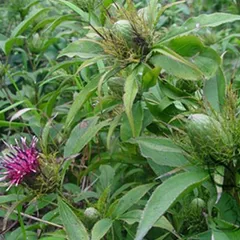
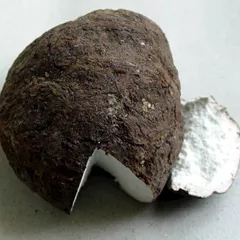
The top herbs in Si Jun Zi Tang are Ginseng (Ren Shen), Atractylodes Rhizomes (Bai Zhu) and Poria-Cocos Mushrooms (Fu Ling)
Si Jun Zi Tang
Source date: 1107 AD
Number of ingredients: 4 herbs
Key actions: Tonifies Qi. Strengthens the Spleen and Stomach.
Formula summary
Si Jun Zi Tang is a 4-ingredient Chinese Medicine formula. Invented in 1107 AD, it belongs to the category of formulas that tonify Qi.
Besides Spleen Qi Deficiency, Si Jun Zi Tang is also used to treat Qi Deficiency or Stomach Qi Deficiency.


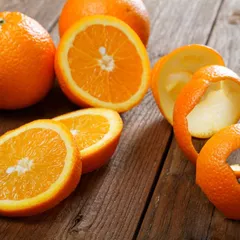
The top herbs in Liu Jun Zi Tang are Ginseng (Ren Shen), Atractylodes Rhizomes (Bai Zhu) and Tangerine Peel (Chen Pi)
Liu Jun Zi Tang
Source date: 1107
Number of ingredients: 6 herbs
Key actions: Tonifies Qi. Strengthens the Spleen and Stomach. Clears Phlegm and mucus. Promotes appetite.
Formula summary
Liu Jun Zi Tang is a 6-ingredient Chinese Medicine formula. Invented in 1107, it belongs to the category of formulas that tonify Qi.
Besides Spleen Qi Deficiency, Liu Jun Zi Tang is also used to treat Qi Deficiency or Spleen and Lung Qi Deficiency.

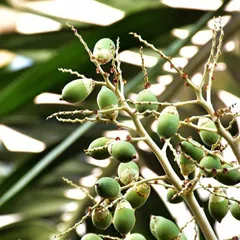
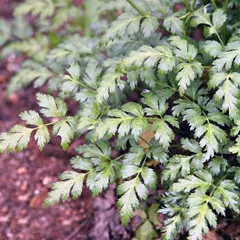
The top herbs in Fei Er Wan are Quisqualis Fruits (Shi Jun Zi), Areca Nuts (Bing Lang) and Goldthread Rhizomes (Huang Lian)
Fei Er Wan
Source date: 1156 AD
Number of ingredients: 8 herbs
Key actions: Kills parasites. Reduces accumulation. Strengthens the Spleen. Clears Heat.
Formula summary
Fei Er Wan is a 8-ingredient Chinese Medicine formula. Invented in 1156 AD, it belongs to the category of formulas that reduce food accumulation and transform Stagnation.
Besides Spleen Qi Deficiency, Fei Er Wan is also used to treat Stomach Heat or Fire.
Diet recommendations
Eat only cooked foods, including rice, millet, meat (especially beef), winter squash, vegetables, greens, aduki beans, congee and warm or room temperature drinks such as warm milk with ginger, cinnamon or cardamom and honey.
Avoid cold, raw vegetables and fruits, juices, iced drinks, ice cream and frozen yogurt, salads, uncooked foods and the excessive use of sugar and other sweeteners.
As for other therapies, try breathing exercises, meditation or moxibustion over the lower abdomen and Kidneys.
As for sport, try mild aerobic exercise such as Yoga, Tai Chi, Qi Gong, swimming, walking or light cycling. Do avoid intense exercise.
Related conditions
Please keep in mind that a Western Medicine condition can be caused by several Chinese Medicine patterns of disharmony and vice versa. As such a patient suffering from one of the conditions below will not necessarily be suffering from Spleen Qi Deficiency, it is just one pattern that's commonly associated with the condition. Click on a condition to learn what other patterns it's associated with.
Chronic gastritis Peptic ulcers Irritable bowel syndrome Chronic hepatitis Nosebleed Anemia Neutropenia Anorexia Acid reflux Hepatitis Nervous exhaustion Habitual miscarriage Ulcers
Consequence patterns
Cold-Damp invading the Spleen is caused by an exterior invasion of Dampness. For this to occur, however, there is nearly always a pre-existing Spleen Qi Deficiency.
Damp-Heat invading the Spleen is caused by an external invasion of Dampness but there is nearly always a pre-existing Spleen Qi Deficiency, which makes the patient vulnerable to the invasion.
Spleen and Heart Blood Deficiency
Spleen Blood deficiency is always preceded by Spleen Qi Deficiency: it is not possible to have the former without the latter.
Spleen Blood Deficiency is always preceded by Spleen Qi Deficiency because the Deficient Food Qi (Gu Qi) fails to produce enough Blood. This situation is much more common in women.
Phlegm Fire harassing the Heart
The presence of Phlegm is the key character of this pattern. In case of Spleen Qi Deficiency, the Spleen's Body Fluids transformation and transportation function is impaired and thus Phlegm is able to accumulate.
Lung Qi Deficiency and Kidney Qi Deficiency can also lead to Phlegm Fire harassing the Heart.
The Spleen is the origin of all Body Fluids transformation and transportation. If this function is impaired, Phlegm accumulates and it can obstructs the Heart and disturb the Mind.
Other than that, Lung Qi Deficiency and Kidney Qi Deficiency can also have impact on body Phlegm accumulation.
Spleen and Liver Blood Deficiency
Spleen Qi Deficiency always precedes Spleen Blood Deficiency
Obstruction Of The Spleen By Dampness with Liver Qi Stagnation
Spleen Qi Deficiency may lead to the formation of Dampness. This Dampness will consequently obstruct the Middle Burner which may interfere with the free flow of Liver Qi, hence the Stagnation.
Both Spleen Qi and Blood Deficiency is the common precursors of Pericardium Blood Deficiency.
The Spleen is responsible for Body Fluids transformation and transportation. Therefore, the malfunction of Spleen Qi can impair this function and accumulate Dampness and Phlegm in the Lungs.
The Spleen is responsible for Body Fluids transformation and transportation. Therefore, the malfunction of Spleen Qi can impair this function and accumulate Dampness and Phlegm in the Lungs.
A Deficiency of Spleen Qi nearly always precedes Damp-Heat in the Stomach as it means the Spleen fails to transform and transport, which leads to Dampness.
Food Stagnation in the Stomach
If left untreated Spleen Qi Deficiency can lead to Food Stagnation in the Stomach
Spleen Qi Deficiency may predispose the patient to Dampness and contribute thus to the development of Dampness in the Gallbladder.
Spleen Qi Deficiency may predispose the patient to Dampness since the Spleen rules transformation and transportation of Body Fluids and a deficiency might lead to an accumulation of Dampness
Damp-Heat in the Large Intestine
Spleen Qi Deficiency can give rise to Dampness formation, which then get stored in the Large Intestine.
Spleen Qi Deficiency often predisposes the patient for the development of Dampness in the Bladder.
Spleen Qi Deficiency often predisposes the patient for the development of Dampness in the Bladder.
The Spleen is responsible for Body Fluids transportation and transformation. This function can be greatly disturbed due to lack of Spleen Qi, thus the accumulation of general Dampness pattern. If the patients happen to be in a cold environment, the Dampness then gets together with the Cold.
Spleen Qi Deficiency can cause Phlegm accumulation. It can get stores in the Uterus and leads to this this pattern.
If the Spleen fails to perform its transforming and transporting functions, Body Fluids accumulates and form Dampness. When this Dampness combined with Liver Heat, it forms Damp-Heat in Liver.
Spleen Qi Deficiency frequently leads to the pattern of Stomach Qi Deficiency.
Qi is a kind of Yang elements, thus Deficiency of Spleen Qi can cause Deficient Yang in the Organ.
When the Spleen Qi is weak, it fails to raise Qi so that it can not hold the Organs in their original places in Lower and Middle Burners.
When Spleen Qi is Deficient, which is a pre-requesite in this case, the Spleen fails to fulfill its function of holding Blood in the vessels.
This is why bleeding symptoms appears all over the place: under the skin, in the stools, the urine or from the Uterus.
A Spleen Qi Deficiency may also affect the Heart, giving rise to Heart Qi and often Heart-Blood Deficiency.
According to Five Phases theory, Earth (the Spleen) is the Mother of Metal (the Lungs). Therefore Spleen Qi Deficiency often leads to Lung Qi Deficiency and vice versa.
A Spleen Qi Deficiency may also affect the Heart, giving rise to Heart Qi and often Heart-Blood Deficiency.
Spleen Qi Deficiency may also lead to Kidney Yang Deficiency, especially if there is Dampness.
Phlegm in Kidneys or Gallbladder
If the Spleen can not transform and transport Body Fluids properly, it descends to the Lower Burner such as the Kidneys or Gallbladder and form Phlegm, which is a formation of stones.
